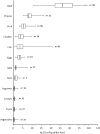Vegetarian Diets: Planetary Health and Its Alignment with Human Health
- PMID: 31728487
- PMCID: PMC6855976
- DOI: 10.1093/advances/nmz019
Vegetarian Diets: Planetary Health and Its Alignment with Human Health
Abstract
To maintain planetary health, human activities must limit the use of Earth's resources within finite boundaries and avoid environmental degradation. At present, food systems account for a substantial use of natural resources and contribute considerably to climate change, degradation of land, water use, and other impacts, which in turn threaten human health through food insecurity. Additionally, current dietary patterns, rich in animal products and excessive in calories, are detrimental to both population and planetary health. In order to resolve the diet-environment-health trilemma, population-level dietary changes are essential. Vegetarian diets are reported to be healthy options. Most plant-sourced foods are less resource intense and taxing on the environment than the production of animal-derived foods, particularly meat and dairy from ruminants. This review article explores simultaneously the environmental sustainability of vegetarian diets, and its alignment with people's health. In general, the progression from omnivorous to ovolactovegetarian and vegan diets is associated with increased environmental sustainability. Greenhouse gas emissions resulting from vegan and ovolactovegetarian diets are ∼50% and ∼35% lower, respectively, than most current omnivore diets, and with corresponding reductions in the use of natural resources. Concomitant health benefits could be obtained by shifting from current dietary patterns to sustainable vegetarian diets. Thus, there seems to be an alignment of health and environmental outcomes for vegetarian diets. Although this shows the human health and environmental sustainability benefits of vegetarian diets in high-income countries, questions remain about the challenges in other contexts and the political will to promote meat-free diets as the social norm.
Keywords: environmental impact; environmental nutrition; health; ovolactovegetarian; planetary health; plant-based diet; sustainability; sustainable diet; vegan; vegetarian.
Copyright © The Author(s) 2019.
Figures


References
-
- Steffen W, Sanderson RA, Tyson PD, Jäger J, Matson PA, Moore B, Oldfield F, Richardson K, Schellnhuber HJ, Turner BL, Wasson RJ. Global change and the Earth system: a planet under pressure. [Internet]. Springer; 2004. Available from: http://www.igbp.net/publications/igbpbookseries/igbpbookseries/globalcha.... Accessed on February 2018.
-
- Rockstrom J, Steffen W, Noone K, Persson A, Chapin FS, Lambin EF, Lenton TM, Scheffer M, Folke C, Schellnhuber HJ et al. .. A safe operating space for humanity. Nature. 2009;461(7263):472–5. - PubMed
-
- Burlingame B, Dernini S. Sustainable diets and biodiversity: directions and solutions for policy, research and action. FAO; 2012.
-
- Intergovernmental Panel on Climate Change (IPCC). Climate change 2014: synthesis report. Contribution of Working Groups I, II and III to the fifth assessment report of the Intergovernmental Panel on Climate Change [core writing team, RK Pachauri and LA Meyer (eds.)]. [Internet] IPCC, Geneva, Switzerland, 2014; 151pp Available from: https://www.ipcc.ch/pdf/assessment-report/ar5/syr/AR5_SYR_FINAL_All_Topi....Accessed on February 2018.
Publication types
MeSH terms
LinkOut - more resources
Full Text Sources
Medical

